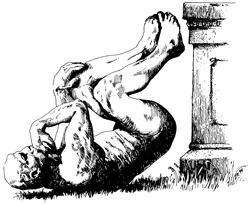 The 2018 Ig Nobel Prizes were awarded September 13 in a ceremony at Harvard’s Sanders Theatre. The ceremony was webcast
The 2018 Ig Nobel Prizes were awarded September 13 in a ceremony at Harvard’s Sanders Theatre. The ceremony was webcast
- MEDICINE PRIZE [USA] — Marc Mitchell and David Wartinger, for using roller coaster rides to try to hasten the passage of kidney stones.
- ANTHROPOLOGY PRIZE [SWEDEN, ROMANIA, DENMARK, THE NETHERLANDS, GERMANY, UK, INDONESIA, ITALY] — Tomas Persson, Gabriela-Alina Sauciuc, and Elainie Madsen, for collecting evidence, in a zoo, that chimpanzees imitate humans about as often, and about as well, as humans imitate chimpanzees.
- BIOLOGY PRIZE [SWEDEN, COLOMBIA, GERMANY, FRANCE, SWITZERLAND] — Paul Becher, Sebastien Lebreton, Erika Wallin, Erik Hedenstrom, Felipe Borrero-Echeverry, Marie Bengtsson, Volker Jorger, and Peter Witzgall, for demonstrating that wine experts can reliably identify, by smell, the presence of a single fly in a glass of wine.
- CHEMISTRY PRIZE [PORTUGAL] — Paula Romão, Adília Alarcão and the late César Viana, for measuring the degree to which human saliva is a good cleaning agent for dirty surfaces.
- MEDICAL EDUCATION PRIZE [JAPAN] — Akira Horiuchi, for the medical report “Colonoscopy in the Sitting Position: Lessons Learned From Self-Colonoscopy.”
- LITERATURE PRIZE [AUSTRALIA, EL SALVADOR, UK] — Thea Blackler, Rafael Gomez, Vesna Popovic and M. Helen Thompson, for documenting that most people who use complicated products do not read the instruction manual.
- NUTRITION PRIZE [ZIMBABWE, TANZANIA, UK] — James Cole, for calculating that the caloric intake from a human-cannibalism diet is significantly lower than the caloric intake from most other traditional meat diets.
- PEACE PRIZE [SPAIN, COLOMBIA] — Francisco Alonso, Cristina Esteban, Andrea Serge, Maria-Luisa Ballestar, Jaime Sanmartín, Constanza Calatayud, and Beatriz Alamar, for measuring the frequency, motivation, and effects of shouting and cursing while driving an automobile.
- REPRODUCTIVE MEDICINE PRIZE [USA, JAPAN, SAUDI ARABIA, EGYPT, INDIA, BANGLADESH] — John Barry, Bruce Blank, and Michel Boileau, for using postage stamps to test whether the male sexual organ is functioning properly—as described in their study “Nocturnal Penile Tumescence Monitoring With Stamps.”
- ECONOMICS PRIZE [CANADA, CHINA, SINGAPORE, USA] — Lindie Hanyu Liang, Douglas Brown, Huiwen Lian, Samuel Hanig, D. Lance Ferris, and Lisa Keeping, for investigating whether it is effective for employees to use Voodoo dolls to retaliate against abusive bosses.
The Ig Nobel Prizes are organized by the magazine Annals of Improbable Research. The ceremony is co-sponsored by the Harvard-Radcliffe Society of Physics Students and the Harvard-Radcliffe Science Fiction Association.
Discover more from File 770
Subscribe to get the latest posts to your email.

The Ig Nobel Award Ceremony has introduced an innovation that I’d really love to see other award ceremonies adopt–though I doubt if any would dare. They hire a cute little girl (who is officially referred to as “Miss Sweetie-Poo”) to wait near the podium, and if an acceptance speech starts to exceed its allotted time, she marches up and begins to say “Please stop! I’m bored!” over and over until the speaker gives up and leaves.
This has proven to be remarkably effective. And I would pay good money to see this happen at the Oscars or Grammies–though I know it never will. 🙂
One of these items really lends new meaning to the term “mailing Nermal to Abu Dabi.”
@Xftr: IgNobel Prize in Psychology, 2025: A study of which Ig Nobel recipients go on the longest during the “Please stop! I’m bored!” cycle. Turns out it’s positively correlated with age of recipient (the causal link is thought to be hearing loss) and likeliest in economics researchers (the causal link is thought to be knowing everything.)